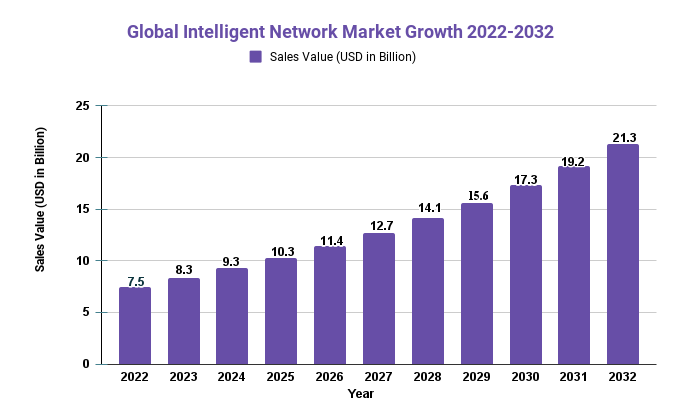Intelligent Network Market Size Worth USD 21.3 Bn by 2032

Page Contents
Market Overview
Published Via 11Press: Intelligent Network Market refers to the application of advanced computing technologies such as machine learning, artificial intelligence, and the Internet of Things (IoT) to create networks that are autonomous, self-optimizing, and self-healing. This market is growing rapidly as organizations seek to use these innovations for improved network performance, increased operational efficiency, and cost reduction.
The Intelligent Network Market size is projected to grow from USD 7.5 Bn in 2022 to USD 21.3 Bn by 2032, expanding at an annual compound growth rate (CAGR) of 11.0% during the forecast period.
The report indicates that North America is the leading market for intelligent networks, due to the presence of several large enterprises and the widespread adoption of advanced technologies in this region.
The intelligent network market can be divided into various components, such as software, hardware, and services. The software segment is expected to hold the largest share of this market during the forecast period since it serves as the primary enabler for deploying intelligent networks.
The demand for intelligent networks is being fuelled by several factors, such as the need for faster and more reliable connections, the increasing volume of data generated by connected devices, and cloud computing's growing popularity. With organizations continuing to adopt these technologies, the market for intelligent networks is expected to expand at an impressive rate.

Drivers, trends, and challenges have an impact on market dynamics, which can impact businesses. Request for PDF sample report
Key Takeaways
- The global intelligent network market size is projected to grow from USD 7.5 Bn in 2022 to USD 21.3 Bn by 2032, expanding at an annual compound growth rate (CAGR) of 11.0% during the forecast period.
- The software segment is expected to dominate the market during the forecast period, as it serves as the primary enabler of intelligent networks.
- North America leads the global intelligent networks market followed by Europe and the Asia Pacific.
- The demand for intelligent networks is being spurred on by factors such as the need for faster and more dependable connections, the rise in data generated by connected devices, and the growing acceptance of cloud computing.
- Key players in the intelligent network market include Cisco Systems, Ericsson, Huawei Technologies, Nokia Networks, and Juniper Networks.
Regional Snapshot
- North America is the leading market for intelligent networks, thanks to several large enterprises and the widespread adoption of advanced technologies in this region.
- Europe is projected to experience significant growth in the intelligent network market, due to the rising adoption of cloud computing and IoT technologies.
- Asia Pacific is forecasted to experience the fastest growth rate due to the increasing adoption of digital technologies and the presence of several emerging economies within the region.
- Latin America and the Middle East and Africa are expected to experience moderate growth in the intelligent network market due to their increasing adoption of advanced technologies.
Drivers
- Growing Need for Faster and Reliable Networks: With the growing amount of data generated by connected devices, there is an increasing need for networks that offer faster transmission rates.
- Increased Adoption of Cloud Computing: Cloud computing has seen a meteoric rise in popularity among businesses due to its scalability and cost-efficiency, sparking an expanding need for intelligent networks that can support cloud-based applications and services.
- Advancements in artificial intelligence and machine learning: Advances in AI and machine learning technologies have made it possible to construct intelligent networks that self-optimize, self-heal, and operate autonomously.
- Increasing Adoption of IoT Technologies: As more devices connect to the internet, their data volumes grow exponentially, necessitating intelligent networks that can efficiently handle and process large amounts of information.
Restrictions
- High implementation costs: Constructing intelligent networks requires expensive hardware and software components, which may prove prohibitively expensive in the short term.
- Lack of Skilled Professionals: To develop and deploy intelligent networks, it is necessary to hire experts with knowledge in areas such as AI, machine learning, and networking.
- Security Concerns: As intelligent networks become more intricate and interconnected, security risks and the potential for cyber attacks have become increasingly prominent.
- Regulatory Challenges: The development and deployment of intelligent networks are subject to regulatory frameworks that may differ across different regions and countries, creating obstacles for businesses operating in multiple jurisdictions.
Opportunities
- Rising Demand for 5G Networks: The introduction of 5G networks promises to open up new possibilities in intelligent networks, as these new systems require advanced technologies like AI and machine learning in order to run optimally.
- Edge Computing Adoption: Edge computing has seen a meteoric rise in popularity among businesses due to its faster data processing and reduced latency. This has created opportunities for intelligent networks that can accommodate edge computing applications.
- Expansion of IoT Applications: The proliferation of IoT applications across industries such as healthcare, manufacturing, and transportation promises to create new opportunities for intelligent networks.
- Advancements in AI and machine learning: As AI and machine learning technologies continue to advance, there is an expanding opportunity for intelligent networks that can utilize these advances to enhance network performance while decreasing costs.
Challenges
- Security concerns: As intelligent networks become more interconnected and complex, there is growing concerned about security risks and the potential for cyber attacks.
- Lack of Standardization: The lack of uniformity in the intelligent network market can present difficulties for businesses operating across multiple jurisdictions.
- High Implementation Costs: Adopting intelligent networks requires expensive hardware and software components that may not be widely available.
- Lack of Skilled Personnel: Successful implementation and operation of intelligent networks necessitate highly qualified personnel with expertise in areas such as AI, machine learning, and networking. A shortage of such experts can present obstacles for businesses attempting to implement intelligent networks.
Recent Developments
- In January 2023, Ericsson announced the launch of its Intelligent Transport Network solution, which is designed to support high-capacity, low-latency applications in the transportation sector.
- In November 2022, Cisco Systems announced the acquisition of a startup called CloudCherry, which specializes in AI-powered customer experience analytics.
- In September 2022, Nokia Networks announced the launch of its Intelligent Access solution, which is designed to enable operators to optimize their networks for capacity, coverage, and quality of service.
- In July 2022, Huawei Technologies announced the launch of its Intelligent Video Surveillance solution, which is designed to enable real-time video analytics for security and surveillance applications.
Key Market Segments
Type
- Freephone Service
- Personal Service
- Virtual Private Network Service
- Alternative Automatic Billing Service
- Premium Rate Services
Application
- Telecom Service Providers
- Cloud Service Providers
- Managed Network Service Providers
- Other Enterprises
Key Market Players
- Cisco
- Huawei
- Ericsson
- Tech Mahindra
- Aruba
- Nokia
- Juniper Networks
- Colt Technology Services
- Netcracker
- Sandvine
- Loom Systems
- Aricent
- Ennetix
- Aria Networks
- Extrahop Networks
- Entuity
- Apcon
- Mist Systems
- Bluvector
- Nitro Mobile Solutions
Report Scope
| Report Attribute | Details |
| The market size value in 2022 | USD 7.5 Bn |
| Revenue forecast by 2032 | USD 21.3 Bn |
| Growth Rate | CAGR Of 11.0% |
| Regions Covered | North America, Europe, Asia Pacific, Latin America, and Middle East & Africa, and Rest of the World |
| Historical Years | 2017-2022 |
| Base Year | 2022 |
| Estimated Year | 2023 |
| Short-Term Projection Year | 2028 |
| Long-Term Projected Year | 2032 |
Frequently Asked Questions
Q: What is an intelligent network?
A: An intelligent network is a network that uses advanced technologies such as AI, machine learning, and automation to improve network performance and reduce costs.
Q: What are the key components of an intelligent network?
A: The key components of an intelligent network include software-defined networking, network function virtualization, and advanced analytics.
Q: What are the benefits of an intelligent network?
A: The benefits of an intelligent network include faster data transmission, improved network performance, reduced costs, and increased reliability.
Q: What are the applications of intelligent networks?
A: The applications of intelligent networks include cloud computing, edge computing, IoT, and smart cities.
Q: Who are the key players in the intelligent network market?
A: The key players in the intelligent network market include Cisco Systems, Ericsson, Huawei Technologies, Nokia Networks, and Juniper Networks.
The team behind market.us, marketresearch.biz, market.biz and more. Our purpose is to keep our customers ahead of the game with regard to the markets. They may fluctuate up or down, but we will help you to stay ahead of the curve in these market fluctuations. Our consistent growth and ability to deliver in-depth analyses and market insight has engaged genuine market players. They have faith in us to offer the data and information they require to make balanced and decisive marketing decisions.